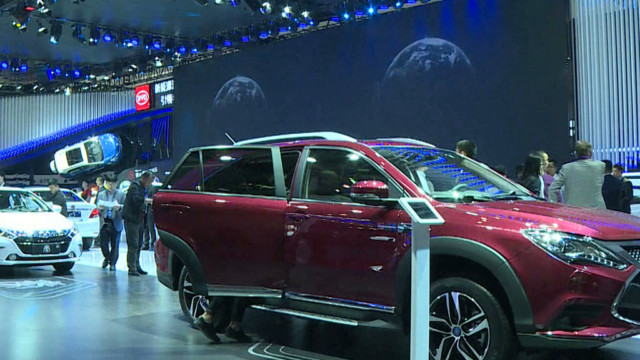Around the world, more than one million electric vehicles are on the road. One country seeing significant growth: China.
In fact, it is the world’s largest electric vehicle market. Last year, more than 500,000 battery electric or plug-in hybrids were registered in China alone.
CGTN’s Elaine Reyes reports.
It’s one of the newest factories for Shenzhen-based B-Y-D, a leader in the development of the China’s electric vehicles. Inside the factory, it is developing state-of-the-art electric buses. But the factory isn’t in China. It’s actually in Hungary.
“Hungary has a very good investment environment and are bound to welcome the new technology, especially the electrical bus technology to come here to renovate the bus industry,” said Chen Yongping, the Operation Director at BYD Hungary. “And also, locally we have very good, trained, skilled workers.”
The BYD factory in Hungary opened earlier this year. The buses meet strict regulations, set by the European Union. On a five hour charge, the buses can drive for about 300 kilometers. Another BYD factory is set to open in France.
“Iron-phosphate batteries made in China at the BYD center and I can say that we have a complete supply chain in-house in the BYD, from the batteries to the complete vehicle,” said Jozsef Laskoi, Production Manager at BYD Hungary. “And these, I can say middleweight or light weight batteries and drive the bus so far away.”
China is the world’s largest auto market and electric vehicles are clearly the car of the future. Beginning in 2019, one in ten cars sold in China will be electric. That’s the requirement for large auto makers, recently set by the Chinese government. As it stands now, Chinese companies dominate the country’s electric vehicle market. All of the top five electric car sellers in China are Chinese. Foreign auto makers like Volkswagen and Nissan are racing to join in.
“We will invest together without our two joint ventures about 10 billion euros in that period to develop these new energy vehicles, to industrialize that in our plans, develop the people and so on,” said Jochem Heizmann, President and CEO, Volkswagen China.
“What we want is to bring all our knowledge to the Chinese market,” said Carlos Ghosn, Chairman and CEO, Renault Nissan. “Working with Chinese engineers, working with Chinese suppliers, in order to bring very affordable electric cars that should come to the market 2019.”
One of the barriers to increasing electric vehicle sales is cost. They’re simply more expensive. Others are concerned about the materials used to build the cars themselves.
“Automakers on the other hand, have the responsibility to make sure that not only the fuel of the car but also the materials that are used to assemble the car is taken care of their environmental impact as well, “said Lo Sze Ping, CEO, WWF China.
 CGTN America
CGTN America

